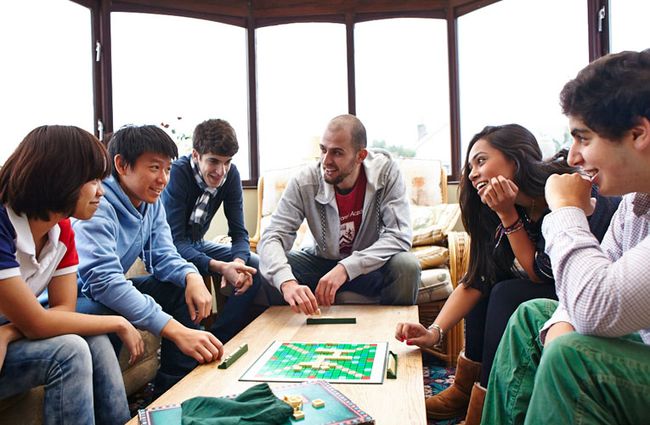你是家长?还是教育机构的咨询顾问?还是一位在考虑到底上不上国际学校的学生?无论是哪一类人,一定都超级想知道作为一个国际学校的学生到底是怎样的体验,与其一直听说,不如听我这个有很多亲身体验的人来说!国际学校向来有容乃大,不同种族的人们纷至杳来。就拿我举个例子吧,我在国际学校学习过这么多年,小伙伴里就有保加利亚人、尼泊尔人、瑞典人、巴基斯坦的旁遮普人,当然还有混血儿、甚至来自委内瑞拉的华人。所以你应该也想象得出,不管是文化氛围还是语言,国际学校都要和普通学校来得很不一样,处在这样的一个学校中,老实讲,也是一件非常有意思的事情。而且除了以法语和德语为主的国际学校,其他学校基本上都是以英语为主。但你以为学校是国外课程,那语言沟通方面就相当统一了?哈哈哈当然不是,就好像在中国普通话也分京片子、四川话、东北话之类的口音一样,毕竟国内很多学校所谓的“国际”,只不过课程而已是国际的,但实际上孩子之间还是讲中文,缺乏全英的语境。这一点也是家长务必要考虑到的,不仅是老师到底用不用英文讲课,而是孩子之间平时有没有讲英文这种习惯。即使是在英国制度的学校,也有许多学生带有所谓的“国际学校口音”。他们把北美和英国的口音结合在一起,举一反三以后甚至可以比原来的发音更完美。也正是因为他们(TCK)的这种“语言弹性”技能,让他们在教授英语的技能上直接赢在了起跑线上。对于我个人而言,其实我也特别疑惑,讲道理,这类人的学习方式难道不是最应该被借鉴学习的吗?
但是事实却是,当家长或指导老师把学生放到一个国际学校时,他们就会理所当然的认为,嗯,我孩子的英语水平一定会直线上升!然后出口成章!马上下笔有神!最后走上他的英语学习巅峰!这个白日梦未免也太天真,你该醒一醒了朋友!想让这么一个听起来就是错误的想法实现,闭着眼睛都知道怎么可能?而且学生们在休息娱乐时运用外语能够大幅度提升英语?答案当然是NO,没有老师给他们加强其语言结构和词汇的前提的话,这种进步基本上可以忽略不计。而且举个例子,在进入美国学校之前,我一直带有本地口音(比如苏格兰或者新加坡),因为和我一起玩耍的小伙伴就自带这种口音,完全被他们口音所洗脑的我,就算我的英语老师来自于其他国家也没办法帮我纠正过来。
更重要的是,我给大家讲个好玩儿的,如果你问一个国际学校的学生“你从哪里来?”,你在对方心里基本上已经是负分滚粗的状态了。就比如我小的时候,每当遇到这类问题,我都会在内心深处蜷进一个小角落里,然后歇斯底里地尖叫。这问题太讨厌了!我到底来自于哪里呢?我在美国出生,但成长过程中辗转于六个国家或地区。是啊,我也能感觉到我身份复杂,我是美籍华裔,但我更喜欢英超;我能无障碍听懂浓重的苏格兰口音,是因为我是在那边读的小学,又而且是在新加坡开始学中文(当地人叫做华语)。所以你非要问我从哪里来?不如你给我个标准答案?而且想想我经历的这一切,给了我极强的环境适应能力,在我的职业生涯中,无论是由巨头经营的中国本土企业,还是由英国人领导的大型跨国公司,抑或是在韩国人快节奏的创业环境,对我而言都毫无问题,不仅点满了环境适应技能甚至可以来一段freestyle。而且从我们国际学校能学到的东西,远比我们后来在常春藤、牛津剑桥这些高等学府学到的有价值的多。说真的,如果教育者能够大力支持,当TCK长大以后,他们的各方面技能绝对领先旁人一大截!
而且一个真正一流的教育工作者,倾听和沟通的能力一定非常强大,所以他们会十分了解TCK的内心感受和斗争,更懂如果他们把情感化为动力,是多么高能热血的一种情况,我也非常佩服这种教育工作者!但……事实却是,教育者中的绝大多数,基本上都是绣花枕头一包草,整天只知道忙着应对官僚主义,专家的外表下是“砖家”,对TCK的经历和心理一无所知!如果你连如何与孩子深度交流都不懂,你怎么配说自己懂教育?说白了,你根本就不懂国际学校孩子对于社会的认知,更甭提对自己身份的认知了ok?
最后,说了这么多,希望我作为一个TCK,给大家分享学习生涯结束20年后的感受能对你们起到一些帮助,让大家对国际学校有更清晰的认知,但是这点理论的价值不可能比的上要轻一个专业人士为国际学校的孩子们(TCK)塑造一个学生支持体系,无论是在学习或课外方面。
——————以下来自Andy老师的英文原稿——————
International Schools and Third Culture Kids
For agents and parents that are looking to understand more about how their children may potentially feel as an international school student, let me give you some perspective. International schools are a big melting pot, you will find people of all different ethnicities. Let’s put this into perspective, my good friends growing up were ethnically Nepali, Bulgarian, Swedish, Punjabi Pakistani and even mixed heritages; I’ve also had fellow friends who come from places such as Venezuela but are of Chinese descent. It’s not just the cultural composition of their peer groups that are different from conventional schools, but even the language as well. Barring international schools with other languages such as French and German, English is by far the most common international school language. Even in British curriculum schools for instance, there are many students that have the so-called “international school accent”. This sort of English is a blend of North American and British accents, yet such English speakers can adjust to either end of the spectrum in any given moment, and this sort of English could potentially be even more standard than that of a particular origin. In fact, such English speakers, very much the native English speaker, are even more adept at teaching English because of their “linguistic elasticity” in English. It is utterly bizarre that educators don’t model off a native English-speaking TCK’s approach to learning English!
However, here’s an incredibly amateur mistake many parents and their advisors make when placing students inside a particular international school - they assume that because the school follows a certain curriculum and the official language is English with a well-stacked, that students will automatically become awesome English speakers. Absolutely not! Parents and even educators need to minimalize the impact of the language of the playground and the courts - that is the language that students use when they are playing with one another during and lunch. In fact, one’s language ability growing up is actually built in the environment that they belong to with their peers, and is only reinforced by the teacher with the addition of new linguistic structures and vocabulary. My own personal experiences is very true - prior to entering an American school, I always had the local accent (e.g. Scottish, Singaporean) because that was the accent of my peers, even though my English teachers were from countries such as
Even more importantly, international school kids hate the question “Where Are You From?” When I was younger, every time I got asked that question deep down I would pretend to curl into a little ball and scream to the top of my lungs. It really annoys me, I mean where really am I from? I was born in the US but lived in six countries/regions my whole life. how do they adjust to society? Yes theres an identity crisis at times and I've certainly felt it, im ABC but i prefer English Premier League; I have no problems understanding thick scottish accent and honed my chinese in Singapore. Think of all the upsides to this, I truly am globalized and it has definitely given myself a head start in my career when it comes to adapting new surroundings - be it with extremely local Chinese companies run by tycoons, large multinationals headed by British or a fast paced start up environment with talented Korean folks. Especially for those that are well-educated, our international school upbringing is even more valuable than any Ivy League or Oxbridge further education because it becomes our biggest source of learning. Of course, when the TCK gets older, if educators have provided enough support, he or she will most certainly excel in many areas of soft skills.
For the really top-notch educators, they really understand the innermost feelings and struggles a TCK goes through and how to harness that into superior soft skills, and the reason is simple - they listen to students and try to build an emotional connection. However, more than half of the educators out there are just merely preoccupied with dealing with bureaucracy and acting as if they are experts in education, yet a lot just dont understand what TCK goes through on a daily basis. How can you claim to understand education if you can't even connect with the children on a deeper level.
Hope this provides some context as to how a Third Culture Kid feels 20 years after being in school, but this is no substitute to bring in experts to help create effective programs that provides emotional and spiritual support to TCK students.
AndyZ老师简介:
- Multicultural and multilingual: Grew up and lived in a number of countries, American-born Chinese and Third Culture Kid (TCK)
多文化和多语言:在多个国家成长和居住;美籍华人,典型第三文化人士(TCK)
- Leader in empowering corporate training and recruitment professionals with assessment methodologies and project-based learning andragogy
为企业培训和招聘人士提供领先评估体系和游戏化的项目式学习的职场教学法领袖
- Decade of experience in education and training, and expert in China
十年以上的学生教育和企业培训的经验:并被很多本土和国外人士称为“中国通”
- UC Berkeley Alumni Club Ex-Leader and Recruitment Ambassador
毕业于世界名校加州伯克利大学并担任校友俱乐部前任负责人和前任招生大使
- Third-party Interviewer for College Admissions
美国第三方面试官(很多大学现在需要学生在提交申请书与第三方机构进行面试)
- Helped build a number of college admissions counseling departments
负责搭建多个海外升学指导中心
- Unlike most“education experts”, personally attended more than a dozen schools growing up and personally went through the AP, IB, British, Singaporean and Hong Kong education systems
相比其他所谓的“教育专家”,从小上过十几所学校,亲自体验过AP、IB、英国、新加坡和香港的教育制度
欢迎大家关注其自媒体平台Andy Z老师。
